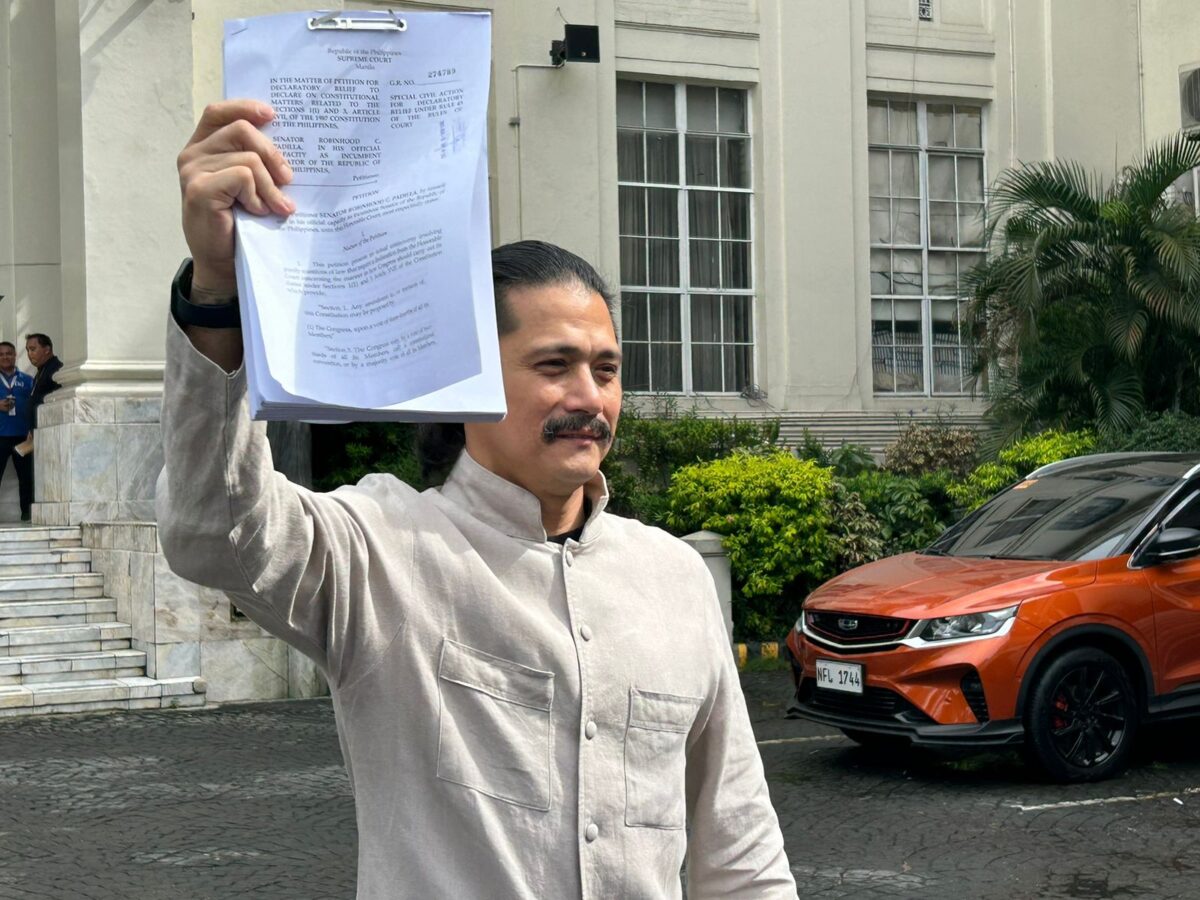
Sen. Robin Padilla holds up the petition filed at the Supreme Court on Monday, August 5, 2024, asking for a resolution of key issues in making constitutional amendments. | Photo by Faith Argosino, INQUIRER.net
MANILA, Philippines — Sen. Robin Padilla has filed a petition with the Supreme Court (SC) seeking to resolve key issues in the 1987 Constitution, specifically on whether both chambers of Congress should vote jointly or separately during discussions on constitutional amendments.
Padilla went to the Supreme Court’s main building on Monday to file the petition seeking declaratory relief on Sections 1 and 3 of Article XVII of the Constitution.
The senator chairs the Senate Committee on Constitutional Amendments and Revision of Codes.
According to the SC, a declaratory relief is “a special civil action filed by any person interested under a deed, will, contract or other written instrument, or whose rights are affected by a statute, executive order or regulation, ordinance, or any other governmental regulation.”
READ: House approves RBH 7 on third reading
Based on a statement sent by Padilla’s office, the petition seeks an “authoritative declaration” of the high tribunal on the following constitutional issues:
- Whether or not the Senate and House should jointly convene as a constituent assembly when proposing amendments to, or revisions of, the Constitution under Section 1 (1), Article XVII of the Constitution;
- When voting jointly, should the requirement of a three-fourth vote under Section 1 (1) be treated as a three-fourth vote by the Senate, plus a three-fourth vote by the House; or three-fourth by the 24 senators with all members of the House of Representatives;
- Whether the Senate and House should jointly convene and assemble when voting for calling a Constitutional Convention and/or submitting to the electorate the question of calling such a convention;
- When voting jointly, if the requirements of a two-third vote under Section 3, Article XVII, be treated as a two-third vote in the Senate, plus a two-thirds vote in the House; or a two-thirds vote of all 24 senators and all members of the House;
When voting jointly, should the requirement of “majority vote” under Section 3, Article XVII be treated as a majority vote in the Senate, plus a majority vote in the House; or a majority vote of all 24 senators voting with all members of the House.
Padilla said he could not perform his functions as chairman of the Senate committee due to the “ambiguities” of the provisions already mentioned.
He added that only the SC had the power to address what he called “existing actual controversy.”
“As we have witnessed, the leadership of the executive branch and the legislative branch have come together to address these issues,” Padilla said.
“These two branches, however, on their own, cannot resolve these constitutional issues by themselves,” he explained.
“Without the honorable court’s declarative pronouncements, these questions, as well as the unstable relations between the two Houses of Congress, shall persist,” he added.
Padilla also mentioned that many resolutions seeking to amend the Constitution were also previously filed, but remain pending before both chambers’ committees.
On March 20, the House approved on its third and final reading Resolution of Both Houses (RBH) No. 7, a proposal to amend the 1987 Constitution’s economic provisions.
This resolution was patterned after Senate RBH No. 6.
Meanwhile, RBH No. 6 is still pending in the upper chamber.